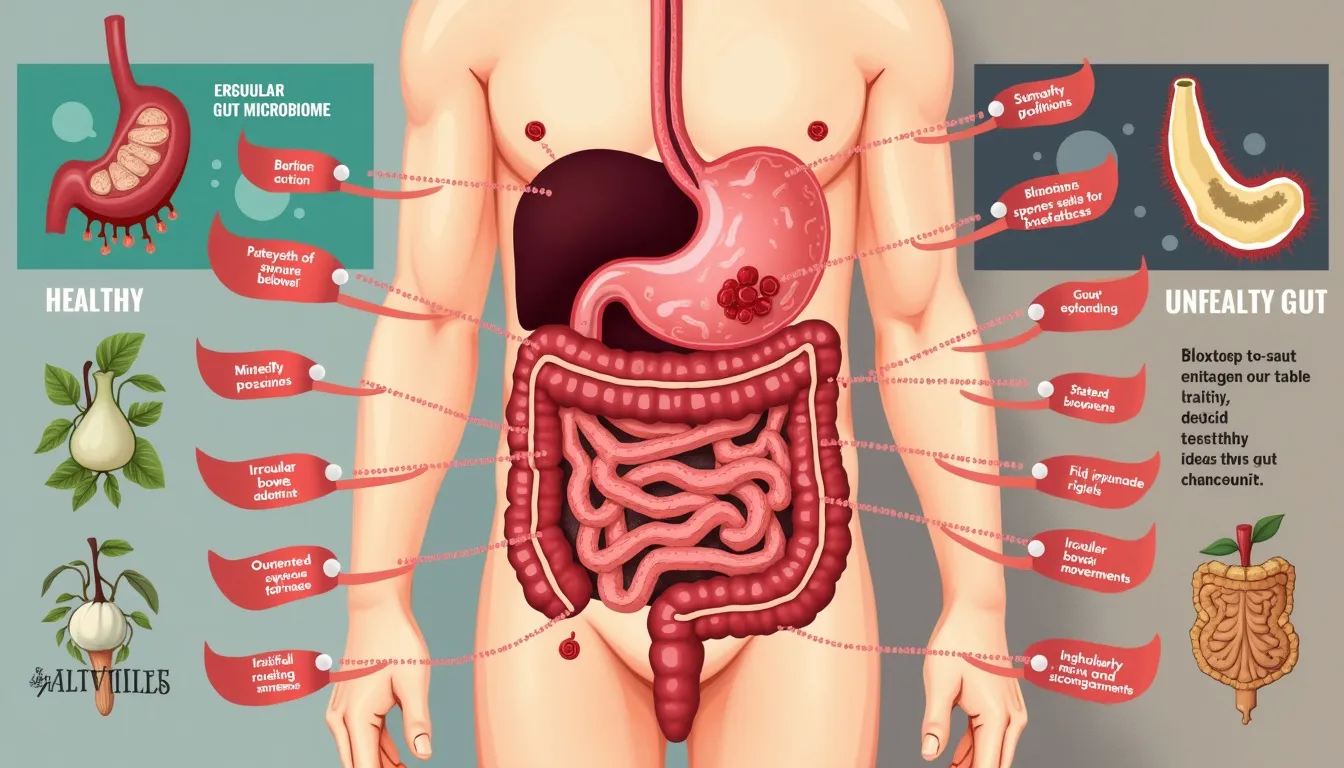In recent years, the focus on maintaining good gut health has significantly increased, underscoring its pivotal role in the overall well-being of an individual. The gut, often referred to as the gastrointestinal tract, encompasses a vast network of organs, including the stomach and intestines, which work in tandem to digest food, absorb nutrients, and expel waste. A healthy gut is home to trillions of beneficial bacteria and other microorganisms, collectively known as the gut microbiome. This diverse microbial community not only aids in digestion but also influences a wide range of bodily functions, from immune response to mental health.
The connection between gut health and overall well-being cannot be overstated. Emerging research indicates that disruptions in the gut microbiome can contribute to various health issues, including chronic conditions like irritable bowel syndrome (IBS), inflammatory bowel disease (IBD), and even metabolic disorders such as obesity and type 2 diabetes. Beyond these physical ailments, an unhealthy gut can also have profound effects on mental health, potentially exacerbating stress, anxiety, and depression.
Despite its critical importance, many people remain unaware of the subtle yet significant signs indicating poor gut health. Common issues such as digestive discomfort, persistent fatigue, unexplained weight changes, and skin problems are often overlooked or attributed to other causes. However, these symptoms can serve as crucial red flags, signaling the need for a closer look at one’s gut health.
By recognizing these warning signs early, individuals can take proactive steps to address underlying gut issues and optimize their health. This involves not only dietary adjustments, such as incorporating more fiber-rich foods and probiotics, but also lifestyle changes like managing stress and maintaining regular physical activity. Understanding and improving gut health can lead to a substantial enhancement in overall quality of life, driven by a holistic approach that encompasses both body and mind.
As we delve deeper into the intricacies of gut health, this article will provide a comprehensive examination of the key red flags that may indicate poor gut health, the role of diet and lifestyle in maintaining a healthy gut, and practical steps individuals can take to foster a robust and balanced gut microbiome.
Red Flags: Recognizing Signs of Poor Gut Health
Introduction to Gut Health
Definition and Importance
Gut health primarily refers to the balance of microorganisms residing in our digestive tract, commonly known as the gut microbiome. This microbiome is composed of trillions of bacteria, viruses, and fungi that play a crucial role in not only digestion but also in our overall health. The human gut is home to approximately 100 trillion microorganisms, a number that outnumbers human cells by about ten to one. These microbes are instrumental in breaking down food, absorbing nutrients, and defending against pathogens.
Connection Between Gut Health and Overall Well-being
The significance of gut health goes beyond digestion. Scientific research has established links between gut health and various aspects of well-being, including immune function, mental health, and even chronic diseases. A well-balanced gut microbiome supports the immune system, helps control inflammation, and may influence sleep and mood through the gut-brain axis—a bidirectional communication system between the central nervous system and the gut. Studies have shown that an imbalanced gut microbiome, known as dysbiosis, is associated with conditions such as irritable bowel syndrome (IBS), obesity, diabetes, and depression.
Brief Overview of Common Gut Issues
Several common issues can indicate an imbalance in gut health. These range from easily noticeable symptoms like bloating, gas, and constipation to more complex ailments including inflammatory bowel disease (IBD) and leaky gut syndrome. Functional gastrointestinal disorders (FGIDs) such as IBS involve chronic digestive symptoms with no identifiable organic cause, affecting up to 15% of the global population. Another underdiagnosed but increasingly recognized condition is leaky gut syndrome, where the lining of the intestines becomes permeable, allowing toxins and partially digested food to enter the bloodstream, which can trigger inflammation and immune responses.
An imbalance in gut flora, often referred to as dysbiosis, can be caused by a variety of factors including a diet high in processed foods, excessive alcohol consumption, and prolonged use of antibiotics. Interestingly, research has shown that even stress can affect gut health by altering the composition and function of the gut microbiome.
To maintain optimal gut health, it’s crucial to be aware of the signs indicating an imbalance and take proactive steps to address them. These measures include adopting a balanced diet rich in fiber and probiotics, managing stress, and staying hydrated. Understanding the importance of gut health and recognizing the signs of its decline can empower individuals to take control of their well-being.
With this foundational knowledge, you are better equipped to dive deeper into the key red flags indicating poor gut health and explore actionable steps to improve your digestive well-being. Each individual’s journey to optimal gut health may differ, but recognizing the underlying importance of a balanced microbiome is a universal starting point.

Key Red Flags Indicating Poor Gut Health
Digestive Discomfort: Bloating, Gas, and Constipation
Digestive discomfort is one of the most direct indications that something might be amiss with your gut health. Symptoms such as bloating, gas, and constipation are common signs worth noting. Bloating occurs when your stomach feels swollen after eating, often due to an imbalance in the gut microbiota or swallowing excessive air. It’s essential to understand that normal digestion doesn’t typically result in persistent bloating.
According to the National Institute of Diabetes and Digestive and Kidney Diseases (NIDDK), bloating can result from various factors, including bacteria overgrowth in the small intestine, known as SIBO (Small Intestinal Bacterial Overgrowth). Additionally, excessive gas might be caused by food that the body struggles to digest effectively, fermenting in the gut and producing gas.
Constipation, characterized by infrequent or hard-to-pass stools, can signal poor gut health. The Mayo Clinic notes that factors such as a low-fiber diet, dehydration, and lack of physical activity can all contribute to constipation. Therefore, persistence of these symptoms warrants paying closer attention to your gut health.
Persistent Fatigue and Sleep Disturbances
One might not immediately link persistent fatigue and sleep disturbances with poor gut health, but research suggests a substantial connection. The gut-brain axis, a bidirectional communication system between the gut and the brain, plays a critical role here. Studies, such as those published in Microorganisms journal, indicate that an imbalanced gut microbiota can influence sleep patterns and contribute to fatigue.
The gut produces various neurotransmitters, including serotonin, which is often referred to as the feel-good hormone. Approximately 90% of serotonin is produced in the gut, and it significantly affects mood and sleep regulation. Consequently, a compromised gut can lead to reduced serotonin levels, resulting in mood swings, anxiety, and difficulties sleeping.
Additionally, chronic inflammation stemming from gut issues can trigger fatigue. A study in the Journal of Translational Medicine highlights how systemic inflammation, often linked with gut health problems, can lead to feelings of tiredness and lethargy.
Unexplained Weight Changes
Unexpected changes in weight, both gain and loss, can be indicative of underlying gut health issues. The balance of the gut microbiota affects how our body absorbs nutrients, stores fat, and regulates hunger signals. Research published in Cell Host & Microbe outlines that specific gut bacteria are more efficient at extracting energy from food, potentially leading to weight gain even if caloric intake hasn’t increased.
Conversely, weight loss can occur if gut health problems interfere with the body’s ability to absorb nutrients properly. Conditions such as celiac disease or Crohn’s disease disrupt nutrient absorption, often leading to unintentional weight loss. Harvard Health Publishing emphasizes the critical nature of recognizing these symptoms early to address potential dietary deficiencies and underlying illnesses.
Skin Issues: Acne, Eczema, and Rashes
The skin, as the largest organ of the body, often reflects internal health, and gut health is no exception. The gut-skin axis theory suggests a strong link between gut health and various skin conditions, including acne, eczema, and rashes.
Acne, a common skin condition, can sometimes be associated with gut imbalances. A study in the Journal of Dermatology indicates that individuals with acne often exhibit different compositions of gut microbiota compared to those with clear skin. This discrepancy suggests that gut health might influence acne development either through direct inflammation or immune system dysregulation.
Eczema and other forms of dermatitis can also be traced back to the gut. Clinical studies, such as those featured in Gut Microbes, have demonstrated that individuals with eczema often have less diverse gut microbiota. Probiotics, beneficial bacteria that support gut health, have shown promise in alleviating some symptoms related to eczema and other atopic conditions.
Lastly, the presence of unexplained rashes might be an early indicator of gut issues. Allergens, pathogens, or certain undigested food particles can trigger immune responses that manifest as skin conditions. Consulting a healthcare provider to explore these gut-related skin issues can be an essential step in finding effective treatments and improvements.
In summary, recognizing these red flags—digestive discomfort, persistent fatigue, unexplained weight changes, and skin issues—are crucial in identifying potential gut health problems. Paying close attention to these symptoms can prompt timely action and improve overall well-being.

The Role of Diet and Lifestyle in Gut Health
The gut is often referred to as the body’s “second brain,” reflecting its crucial role in overall health. Diet and lifestyle choices significantly impact gut health, influencing everything from digestive efficiency to the diversity of the gut microbiome. Understanding these impacts can help individuals make informed decisions to enhance their digestive wellbeing.
Impact of Processed Foods and Sugars
Dietary choices, particularly the consumption of processed foods and sugars, have a pronounced effect on gut health. Processed foods are typically high in unhealthy fats, artificial additives, and refined sugars, which can disrupt the balance of the gut microbiome. Studies have consistently shown that diets high in these components can lead to an overgrowth of harmful bacteria and a reduction in beneficial bacteria within the gut.
For instance, a study published in the journal Frontiers in Microbiology highlighted how diets high in processed sugar can promote the growth of pathogenic bacteria such as Clostridium difficile, which is associated with significant digestive disturbances. Moreover, the frequent consumption of processed foods has been linked to increased intestinal permeability, commonly known as “leaky gut” syndrome, a condition that can lead to widespread inflammation and contribute to a variety of chronic health issues.
Benefits of a Fiber-rich Diet
In contrast, a diet rich in fiber has been consistently associated with positive gut health outcomes. Dietary fiber, found abundantly in fruits, vegetables, legumes, and whole grains, serves as a vital substrate for gut bacteria. When gut microbes ferment these fibers, they produce short-chain fatty acids (SCFAs) like butyrate, propionate, and acetate, which have numerous benefits for gut health.
SCFAs aid in maintaining the integrity of the gut lining, reducing inflammation, and providing energy to the cells of the colon. According to research published in the journal Gastroenterology, a high-fiber diet can increase the abundance of beneficial bacteria such as Bifidobacteria and Lactobacilli. These microbes play essential roles in digestion, nutrient absorption, and protecting against harmful pathogens.
The Importance of Hydration
Hydration is another critical factor in maintaining gut health. Water facilitates the digestion and absorption of nutrients, as well as the elimination of waste products from the body. Adequate hydration ensures that the bowel contents remain soft and move efficiently, preventing constipation.
Dehydration, on the other hand, can slow digestive processes and lead to hard, difficult-to-pass stools. The Institute of Medicine suggests that an adequate total daily water intake is about 3.7 liters for men and 2.7 liters for women, which includes all beverages and moisture in food.
Role of Probiotics and Fermented Foods
Probiotics—live microorganisms that confer health benefits when consumed in adequate amounts—have garnered significant attention for their potential to enhance gut health. These beneficial bacteria can be found in fermented foods such as yogurt, kefir, sauerkraut, kimchi, and miso.
Regular consumption of probiotics can help maintain a balanced gut microbiota, counteracting the adverse effects of factors like antibiotic use, poor diet, and stress. For example, a review in the journal Frontiers in Nutrition highlighted that probiotics can reduce the risk of developing antibiotic-associated diarrhea by replenishing beneficial bacteria in the gut.
Fermented foods are also a source of prebiotics—non-digestible food components that stimulate the growth and activity of beneficial gut bacteria. For instance, fermented dairy products contain Lactobacillus and Bifidobacterium species, which have been shown to improve lactose digestion and gut barrier function, and reduce symptoms of irritable bowel syndrome (IBS) according to research findings in the journal Alimentary Pharmacology & Therapeutics.
Incorporating a variety of fermented foods into the diet can be a simple and effective strategy to enhance gut microbial diversity and overall digestive health. However, it is important to introduce these foods gradually, as a sudden increase in probiotic intake can cause temporary digestive discomfort in some individuals.
Conclusion
The health of the gut is profoundly influenced by dietary and lifestyle choices. From reducing the intake of processed foods and sugars to increasing fiber consumption, ensuring proper hydration, and incorporating probiotics and fermented foods, individuals can take proactive steps to promote a balanced and resilient gut microbiome. These strategies not only enhance digestive health but also contribute to overall well-being, underscoring the integral role of a healthy gut in one’s health journey.

In conclusion, maintaining optimal gut health is essential for overall well-being and can significantly influence various aspects of our physical and mental health. Recognizing the red flags of poor gut health, such as digestive discomfort, persistent fatigue, unexplained weight changes, and skin issues, is the first step towards addressing underlying problems and making necessary lifestyle adjustments.
The role of diet and lifestyle cannot be overstated when it comes to supporting a healthy gut. Diets high in processed foods and sugars can be detrimental, whereas a fiber-rich diet, proper hydration, and the inclusion of probiotics and fermented foods can foster a balanced and thriving gut microbiome. Beyond diet, managing stress and incorporating regular exercise are critical components in promoting gut health.
However, individual needs vary, and what works for one person may not necessarily be suitable for another. Therefore, it is advisable to seek professional guidance from a doctor or nutritionist when dealing with persistent or severe gut health issues. By making informed decisions and adopting a holistic approach, individuals can take proactive steps to enhance their gut health, thereby improving their overall quality of life.
Fostering awareness of gut health and its significant impact is paramount as it reflects a deep interconnectedness with various bodily functions, supporting everything from digestion to mental clarity. Indeed, a healthy gut lays the foundation for a healthier, more vibrant life.
